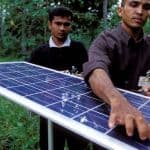Electricity is Just the Beginning: Why Off-Grid Solar Opens the Door to Value-Added Services
It’s unacceptable that access to reliable electricity is unavailable to many rural households and businesses across the developing world. But electricity isn’t the only thing these homes and businesses are missing: Their unmet needs also range from cooking gas to internet access. That’s why it’s so important to think of the bigger picture.
To that end, late last year BBOXX launched its vision for the off-grid home of the future, which we call “Tomorrow’s Rural Home.” Based in Kigali, Rwanda, Tomorrow’s Rural Home is an effort to showcase how an off-grid home could operate in the next decade. As such, it reflects the needs and desires of rural households in the developing world – including a pay-as-you-go solar energy system, an affordable internet service, as well as LPG gas stoves and biogas. Tomorrow’s Rural Home represents our conceptual approach on how new technologies can address these needs, transform the quality of life in off-grid communities, create new markets and power economic growth in Africa and beyond.
In the off-grid home of the future, we see solar technology leapfrogging traditional grid infrastructures in favour of much smarter solutions. Solar home systems will power these households, micro-businesses and SMEs, providing clean, affordable and reliable energy on a pay-as-you-go basis – but electricity is only the starting point.
Electricity as the entry point to other utilities
Electricity provision creates new markets by opening the door to internet access, mobile phones, TVs and refrigerators, as well as modern cooking gas and water pumping, to name a few. This new access can facilitate economic development at scale, as the hundreds of millions of people living off-grid become customers for a whole range of goods and services. Companies want to access this huge, untapped and underserved market – but they don’t know how. Electricity makes it possible for these companies to design products for a market that, until now, lacked this basic prerequisite for essential modern services.
While solar electricity alone enhances quality of life, providing access to these vital affordable utilities and value-added services is the real game-changer. The widespread uptake of mobile money has provided the right environment for off-grid utilities to operate and thrive. Now is the time to leverage the access they’re providing, to take the next step in unlocking rural Africa’s economic potential.
Creating new markets
The best way for us to achieve this vision is to create strategic partnerships across (and beyond) the off-grid solar industry, bringing in partners who can provide the add-on services that we believe should be in the rural home of the future. For example, BBOXX has started piloting internet access in some parts of Rwanda via Wi-Fi hotspots through a joint venture with Axiom Networks – providing reliable and affordable internet to households, coffee shops, farmers and SMEs. We have plans to extend this rollout across Rwanda and into other markets.
We’ll also need to partner with telcos, major energy investors, governments and technological partners to put our vision into action – and we have a number of existing partnerships that could pave the way. For example, we are working with Orange in West Africa, EDF in Togo and GE in the DRC, in projects aimed at spreading access to off-grid energy. The off-grid solar industry has previously been vertically integrated, but vertical disaggregation will be necessary to expand energy and affordable utility access at scale.
This is the key to linking limited supply with overflowing demand for electricity in Africa – and that’s what makes our trajectory unique. Purchasing a BBOXX solar system is often the first formal contractual relationship the customer experiences. This creates a physical highway, as BBOXX interacts with the customer on logistics, and through sales agents, call centres and technicians. This platform then opens the door to the digital highway, as through this customer relationship, the company can increase access to many more goods and services that these underserviced customers demand.
The future is data-driven
Data can take this progression several steps further. BBOXX collects two billion data points from customers each month, and this data provides unique insight into the world’s off-grid population – a segment that has never been fully understood. In particular, big data can debunk common misperceptions surrounding these off-grid communities. Due to a lack of information about these populations, many governments and investors have not recognized a core reality about the rural poor: They are bankable customers.
At BBOXX, we gather this data through the Pulse platform – a cloud-based task management system on which all BBOXX products and services operate. Pulse is digitising our customers’ ability to make regular payments – improving our understanding of customers’ capacity to pay. This makes it possible to build a digital profile of customers where there had previously been no official information. Data can therefore prove that these rural and off-grid populations are viable customers who demand a range of modern services to improve their quality of life.
Pulse enables the creation of these new marketplaces, and Tomorrow’s Rural Home is a reflection of everything that can become accessible to our customers as a result of energy access.
Unlocking rural Africa’s economic potential
We view Tomorrow’s Rural Home as the first step in showing how an off-grid household or SME can function in the next decade. We believe that off-grid communities should be able to access all modern-day amenities. The concept of Tomorrow’s Rural Home has shown that this can indeed be possible and has signalled the direction the industry should take to translate this vision into action.
The benefits of applying this conceptual approach to the rural African economy will be boundless. The data collected will speed up this process, by acting as evidence of the positive economic activity and demand for value-added services in off-grid communities.
Up to 600 million people still live without access to electricity in sub-Saharan Africa. This number shows both the scale of the challenge and the size of the opportunity. By working together, we can not only increase access to electricity, but also to a range of vital utilities that can radically transform the lives of underserved communities, create new markets and power meaningful economic development.
Mansoor Hamayun is CEO of BBOXX.
Image: A conceptual representation of “Tomorrow’s Rural Home.” Image courtesy of BBOXX.
- Categories
- Energy, Social Enterprise, Technology



